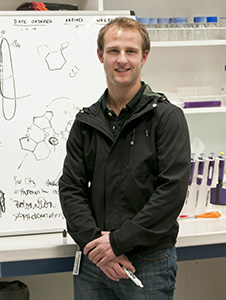Tuesday 20 August 2019 12:14pm
 Dr Aaron Stevens
Dr Aaron Stevens
Children with attention-deficit/hyperactivity disorder (ADHD) who took micronutrients had lower levels of a bacteria linked to the psychological disorder, and a healthier range of bugs in their gut overall, new research shows.
The study was recently published in Nature’s Scientific Reports journal. It was a collaboration between University of Otago, Christchurch geneticists and the University of Canterbury’s Mental Health and Nutrition laboratory.
The pilot study indicates micronutrient supplementation – which includes vitamins and minerals – could be a safe therapy for those with ADHD. It also shows the need for a larger study in the role of a specific bacteria called bifidobacterium on neurodevelopmental disorders such as ADHD.
University of Otago, Christchurch geneticist Dr Aaron Stevens was the lead researcher on the study. He says there is growing evidence internationally indicating the human gut microbiome, or gut bacteria, could have a role to play in the development of disorders such as depression, ADHD and autism. A large recent international study found children with ADHD had significantly higher levels of the bifidobacterium bacteria in their gut than those without the condition.
Using latest DNA technology Dr Stevens and his colleagues analysed the gut bacteria of children given a specific range of micronutrients over a 10-week period. The study was small, with just 17 children aged between 7 and 12 participating. Ten children were given micronutrients, while the others were given a placebo treatment.
The researchers found:
- Taking micronutrients did not negatively affect the overall structure or composition of the microbiome.
- Children taking micronutrients had significantly more Observed Taxonomic Units (OTUs) which is a positive measure of ‘richness’ in the microbiome community.
- Children taking the micronutrients had significantly fewer bifidobacterium than other children.
Professor Julia Rucklidge leads the University of Canterbury’s Mental Health and Nutrition laboratory. She says the latest research is important in showing micronutrients can create some positive changes to the microbiome of children with ADHD in the study.
“What scientists are now wondering is whether people who suffer from specific psychiatric symptoms, like those associated with ADHD, have a different bacterial composition than those who don’t have these symptoms and whether these differences can help us understand the severity of the symptoms,’’ Professor Rucklidge says.
“More research is needed with larger groups of people with ADHD, and to understand the potential effect of diet, medications, age, ethnicity and gender on the results that have been reported.’’
Rucklidge says the pilot study of the effect of micronutrients on the microbiome follows a study of almost 100 children investigating the impact of vitamin-mineral treatment on the aggression and emotional regulation in children with ADHD. That study found micronutrients improved overall function, reduced impairment and improved inattention, emotional regulation and aggression in the child participants.
For an interview contact:
Kim Thomas
Senior Communications Advisor
University of Otago, Christchurch
Mob +64 27 222 6016
Email kim.thomas@otago.ac.nz
